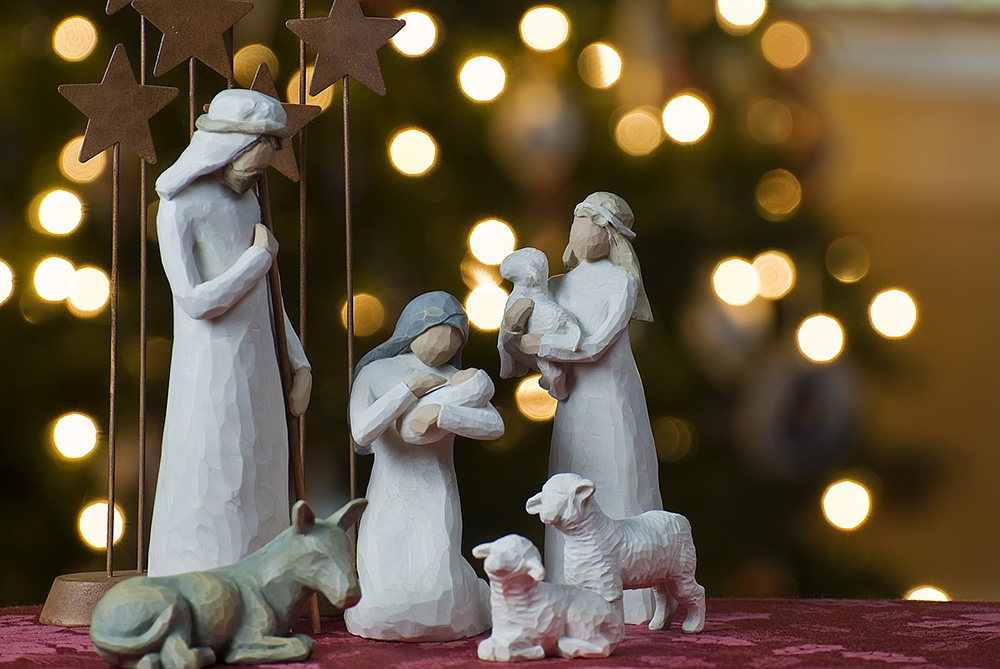Since the season is fast approaching I was wondering if you could give some insights on the topic of Christians and Christmas. I have heard arguments on both sides, and both seem convincing. Those who are against it point to the pagan roots of Christmas, and those who are for it point to the benefits of Christmas in reaching souls for Christ. So how does one find balance?
I would like to think that Christmas should be celebrated but without the use of pagan symbols. But that leaves me in a dilemma which is: How extreme should I be in removing these so called pagan symbols? Should I avoid decorating my house, listening to beautiful Christmas music, watching a movie with Santa in it, etc…? This topic is one that is very frustrating to me, and I would love to hear your thoughts.
God bless!
The history of Christmas has many diverse and cultural contributions and connections. The historical evidence suggests that modern day Christmas has both Christian and pagan roots. To suggest an exclusive pagan or exclusive Christian origin for Christmas misses the historical reality.
But your question is not about the history of Christmas, but given the history of Christmas, what is the proper Christian attitude toward this holiday.
This question is similar to what Paul dealt with in Romans chapter fourteen when those of weak faith were afraid to eat meat bought at market. They were afraid of the food because prior to sale the animal was sacrificed to a pagan god. Paul’s points out that the pagan god is nothing but metal or wood and has no power over the nutritional value of the food purchased. Paul realized the real power was the ideas implanted into the mind. Therefore, he warned if your mental maturity (faith) is weak and you believe that by eating food offered to an idol you have sinned or that the pagan god now has some power over you, then don’t eat it. But if your comprehension of reality is mature and you understand that the pagan idol is nothing, then you can eat the meat and have no distorted ideas or fears placed in your mind.
This is exactly what is happening with the Christmas issue. Those of immature faith, who fear that because Christmas has some historic pagan connections and believe that such roots contaminate the day causing those who celebrate Christmas to sin or pay homage to a pagan god, they best not celebrate the holiday. But those of more mature faith, who recognize that the issue with Christmas is not the historic roots of the holiday, but the heart attitude we hold toward God and our motives in celebrating the holiday, can enjoy Christmas and grow spiritually.
Spiritual immaturity is an inevitable reality as new converts are brought to Christ. New converts must necessarily start out in a spiritually immature place, with the expectation of spiritual growth and maturity. The problem throughout the history of Christianity is that genuine enlightenment and spiritual maturity has too often been replaced with codified behaviors which appeal to the immature. The immature too often, by focusing on behavior and obeying all the “rules,” find themselves in leadership without genuine spiritual insights. This frequently leads to creating superstitious concerns like the Christmas issue or, as has happened recently, making an issue over the name we use for God.
God is not concerned with such petty things. He is concerned with healing our hearts and minds. In Old Testament times God allowed Himself to be addressed by pagan names and even used some of them Himself.
- Adonai used as one of God’s names in Scripture is the name of the Greek god Adonis and was also used by the Phoenicians for their god Tammuz.
- Elohim – means God and is used for both the God of Israel and other gods. The many gods of the Greeks were called Elohim. In the commandment “Thou shall have no other gods before me” Exodus 20:3 – the Hebrew for “gods” as in no other gods, is Elohim, yet God is also addressed by this term.
- Shaddai – The name of God worshipped by Abraham, Isaac and Jacob
- God also said to Moses, “I am the Lord. 3 I appeared to Abraham, to Isaac and to Jacob as God Almighty, (Hebrew El-Shaddai) but by my name the Lord I did not make myself known to them. (Exodus 6:2,3)
- Shaddai is an attribute of a semetic goddess related to Hebrew sad (breast) “the one of the breast” the one who nurtures.
- Others believe it is derived from Shadu – “mountain” Shaddau “mountain dweller” – one of the names of Amurru a semetic shepherd god son of the sky god Anu and sometimes called bêlu šadī or bêl šadê and is the origin of the fertility god Baal adopted by the Canaanites.
The point being, pagan connections do not create problems for the spiritually mature, but the immature often create fears and concerns where none actually exist.
December 25 is not magic, it has no power, but if this day can be beneficial to cause us to consider what Jesus has done for us, the sacrifice God has made to save us and thereby bring us into a closer relationship with Him and our fellow man, then let us celebrate this opportunity to share the truth about God’s kingdom of love.
Parents would be unwise to try and ignore this holiday. Children will not understand. It will likely cause the children to develop superstitions and fear-based approaches to God. And even though December 25 is not the actual birthday of Christ it can be used to direct the mind of the children to Christ. We can act the part of the wise men of the east who brought gifts to Christ and we can seek to bring gifts to Him. This can be done via support of the church or by seeking to bless others, for “as you have done it unto the least of these you have done it unto me,” Christ said.
Regarding decorations and Christmas traditions, these can be part of the celebration of the season and done with good cheer. God instructed ancient Israel during one of their annual feasts to bring boughs of green into their homes. Likewise, we can celebrate with Christmas trees, or holly, which traditionally is symbolic of the thorns worn by Christ and makes lovely decoration that can be used to cheer the home and remind us of the spring to come.
Even in church we should celebrate by decorating for Christmas. One of the founders of my church held similar views on this point. She wrote:
God would be well pleased if on Christmas each church would have a Christmas tree on which shall be hung offerings, great and small, for these houses of worship. Letters of inquiry have come to us asking, Shall we have a Christmas tree? Will it not be like the world? We answer, You can make it like the world if you have a disposition to do so, or you can make it as unlike the world as possible. There is no particular sin in selecting a fragrant evergreen and placing it in our churches, but the sin lies in the motive which prompts to action and the use which is made of the gifts placed upon the tree.
The tree may be as tall and its branches as wide as shall best suit the occasion; but let its boughs be laden with the golden and silver fruit of your beneficence, and present this to Him as your Christmas gift. Let your donations be sanctified by prayer. — Adventis Home, pg 482









 using your credit or debit card (no PayPal account needed, unless you want to set up a monthly, recurring payment).
using your credit or debit card (no PayPal account needed, unless you want to set up a monthly, recurring payment). instead?
instead?